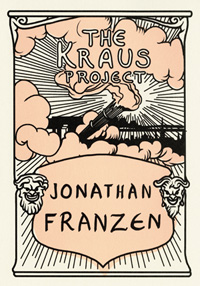
Slate is an Amazon affiliate and may receive a commission from purchases you make through our links.
Dear Internet: Jonathan Franzen Is Not Your Enemy
His strange new book is essentially a multiauthor blog.

Illustration by Peter Bagge.
Jonathan Franzen’s new book, The Kraus Project, is a strange bird: a translation, by Franzen, of century-old essays by the Viennese satirist Karl Kraus with essay-length footnotes that apply Kraus to contemporary affairs and recount the romantic and artistic struggles of Franzen’s youth. In those footnotes, Franzen—as you may have heard—laments much of what the Internet has done to American letters. But the book does not really constitute a dismissal of Internet writing. In fact, its eccentric, Weblike structure—there are footnotes to footnotes of footnotes—provides a model for intellectually serious blogging.
Kraus, Franzen argues, was essentially a blogger. In 1899 he started a magazine, Die Fackel (The Torch) that, from 1911 until his death in 1936, devoted all its page space to one contributor: Karl Kraus. And in true blogger style, Kraus cast himself as a scourge of the mainstream media. He rained scorn on writers and publications he considered overrated and shallow—the first essay translated here, “Heine and the Consequences,” is a takedown of one of the most beloved figures in German literature. The second essay, “Nestroy and Posterity,” uses the obscurity of the satirical playwright Johann Nestroy as the basis for a rant about Viennese society. Kraus “would often start with a press clipping that he would reproduce and dissect,” Franzen notes, “which is the method of a lot of blogs today: cut, paste, and conquer.”
When Franzen discovered him at 22, Kraus replaced David Byrne as his hero, in large part because of his asperity. (A literary Psycho Killer superseded a musical one.) The young Franzen—who comes off here as a tragicomically alienated person, as a Franzen character, in other words—fell in love with aphorisms like, “Believe me, you color-happy people, in cultures where every blockhead has individuality, individuality becomes a thing for blockheads. And spare me this mediocre chicanery in place of one’s own stupidity!”
The above remark contains much of what is great about the Kraus essays in The Kraus Project: the anger that builds to such heights that it becomes funny and laughs at itself, even as it speaks truth to power; the disparagement of something rarely disparaged, individuality. And then there is the lionization of something rarely lionized: stupidity.
Franzen made Kraus’s contrarian outlook his own—and reading The Kraus Project one finds Franzen’s fictional project newly illuminated. In his novels, Franzen often invites the reader to laugh at the darkness hidden in supposedly happy events, and to glimpse the hope hidden in supposedly sad ones. Think of the Emerson family cookout in Freedom, where the middle-aged men hoard a bottle of old Bordeaux for themselves and leave a splash for the women. Think of the death of Alfred Lambert in The Corrections, which affords Alfred’s widow, Enid, a taste of freedom after five decades of serving him.
Kraus also taught Franzen to be skeptical about mixing journalism with the subjectivity and fanciness of literature; Franzen footnotes “Heine and the Consequences” with a quote from a terrible, pseudo-lyrical New York Times profile, to demonstrate the relevance of Kraus’ critique to contemporary newspaper writing. (“If anyone has a right to feel on top of the world, it’s Howard Stern—especially inside his elegant, cumulus-high apartment on the West Side of Manhattan, dominated by a solariumlike living room with views on one side extending far up the Hudson and the other encompassing the entire bucolic breadth of Central Park.”) Kraus writes that when reporting is mixed with loftier forms the two modes “interlard” each other; interlarding is the word Franzen uses in his second novel, Strong Motion, to describe the mingling of news and non-news in the “news with a twist” served up by a dying radio station.
But it is not just the satirical impulses and the skewering of the media that make The Kraus Project feel like an unusually well-written and substantive blog. It’s the structure as well. This book is a conversation among four writers: Kraus, Franzen, the Kraus scholar Paul Reitter, and the Austrian novelist Daniel Kehlmann. Rants by Kraus inspire rants by Franzen. Your attention flits among the four voices—part of the fun is watching how they build off one another, big-up and deflate one another. It’s a dream of what the blogosphere can be, when we blog in a less attention-seeking manner, with due respect for prose style and the complexity of truth. Reitter and Kehlmann contribute footnotes that provide historical context for Kraus’ rampages; Franzen takes up Reitter and Kehlmann’s threads, linking the intellectual situation in early 20th-century Vienna to the contemporary American scene. It’s best to think of The Kraus Project as a series of blog entries by Kraus with a comments section that is just as lively and important as the original posts.
This blogginess also offers a new perspective on what makes Franzen distinctive as a fiction writer. Part of the brilliance of Franzen’s two best novels, The Corrections and Freedom, is that each major character is afforded his or her own Krausian rant. These rants sometimes support one another and sometimes cast doubt on one another. They take the form of persuasively voiced interior monologues, but they often structurally resemble a Kraus essay, or (therefore) a Franzen essay, even as they remain grounded in the perspectives of the author’s fictional protagonists.
Here is Kraus ranting about techno-optimism in “Nestroy and Posterity”:
… Repellent in spirit, perfect just the way they are, these times of ours are hoping to be overtaken by the times ahead, and hoping that the children, spawned by the union of sport and machine and nourished by newspaper, will be able to laugh even better then. There’s no scaring them; if a spirit comes along, the word is: we’ve already got everything we need. Science is set up to guarantee their hermetic isolation from anything from the beyond.
Here is Franzen, striking the same chord in a footnote to “Heine and the Consequences”:
… I confess to feeling some version of [Kraus’s] disappointment when a novelist who I believe ought to have known better, Salman Rushdie, succumbs to Twitter. Or when a politically committed print magazine that I respect, n+1, denigrates print magazines as terminally “male,” celebrates the Internet as “female,” and somehow neglects to consider the Internet’s accelerating pauperization of freelance writers. Or when good lefty professors who once resisted alienation—who criticized capitalism for its restless assault on every tradition and every community that gets in its way—start calling the corporatized Internet “revolutionary,” happily embrace Apple computers, and persist in gushing about their virtues.
And here is Franzen, in a similar mode, but writing as the fictional character Walter Berglund, in Freedom:
… To Walter the message of every single radio station was that nobody else in America was thinking about the planet’s ruination. The God stations and the country stations and the Limbaugh stations were all, of course, actively cheering the ruination; the classic-rock and news-network stations continually made much ado about absolutely nothing; and National Public Radio was, for Walter, even worse … The NPR news unit, once upon a time fairly liberal, had become just another voice of center-right free-market ideology, describing even the slightest slowing of the nation’s economic growth rate as “bad news…”

Shelby Graham
Elsewhere in Freedom, another central character, Richard Katz, a rock musician, rants about Apple products, consumerism, and the fake rebelliousness of his fellow troubadours. In The Corrections, Alfred Lambert rants inwardly about the deterioration of America’s transportation infrastructure, which parallels the deterioration of its morals; his son, Chip, rants about consumerism; Enid Lambert, Chip’s mother and Alfred’s wife, rants to herself about Alfred’s foolishness as an investor. Like Kraus essays, these rants build lyrical momentum as they draw the reader deeper and deeper into a pit of rage. Like The Kraus Project, and like the very best blogs, Franzen’s novels constellate their characters’ essayistic rants in such a way that the rants resonate with one another and achieve a greater meaning in concert than they could separately.
It’s sad, then, that so many bloggers view Franzen as an enemy. New York’s culture blog, Vulture, asserts that Franzen is “coming down on everybody else for liking their computers.” But in The Kraus Project, Franzen explicitly states that he likes his new Lenovo laptop and that computerized word-processing is essential to his writing process. Slate’s XX Factor blog alleges, in a headline for a post about The Kraus Project, that “Jonathan Franzen Misses the Old Days, When Women Couldn’t Tweet Back,” even though Franzen never connects Twitter to women, and explicitly rejects the notion that the Web should be thought of as female. There is no better affirmation of Franzen’s fears about what the Web has done to reading than the sloppiness with which his critics read him.
It seems the principal reason intelligent bloggers rush to judgment about The Kraus Project, and Franzen generally, is that Franzen attacks Twitter. He only does it for a few paragraphs, but this fragment of the book has been so discussed, in various interlarding blogs and tweets, that it has come to sound like Franzen’s single obsession. Thereby Franzen comes to be perceived as a famous, acclaimed writer raging at a form in which nonfamous, nonacclaimed writers often seek to prove and promote themselves, a big writer stomping on smaller ones. (To be fair, Franzen can be as careless as his critics: The n +1 piece he mentions in the quote above actually mocks the notion that the Internet is female.)
Like Kraus, Franzen both loves and hates the journalism of his time, which is why, like Kraus, he writes about it. Kraus once said, “I have nothing to say about Hitler,” because he directed his criticism only at educable, comprehensible subjects—worthy subjects. Franzen has said you must love your fictional characters but you must also be hard on them, and his harshness toward contemporary journalism is compatible with love.
It’s natural that bloggers who are more optimistic about Twitter than Franzen should return fire. I only wish they would read his books, not just the excerpts that make it online, or his quotes from interviews. They might discover an unlikely ally.
---
The Kraus Project by Jonathan Franzen and Karl Kraus. Farrar, Straus and Giroux.
See all the pieces in this month’s Slate Book Review.
Sign up for the Slate Book Review monthly newsletter.
